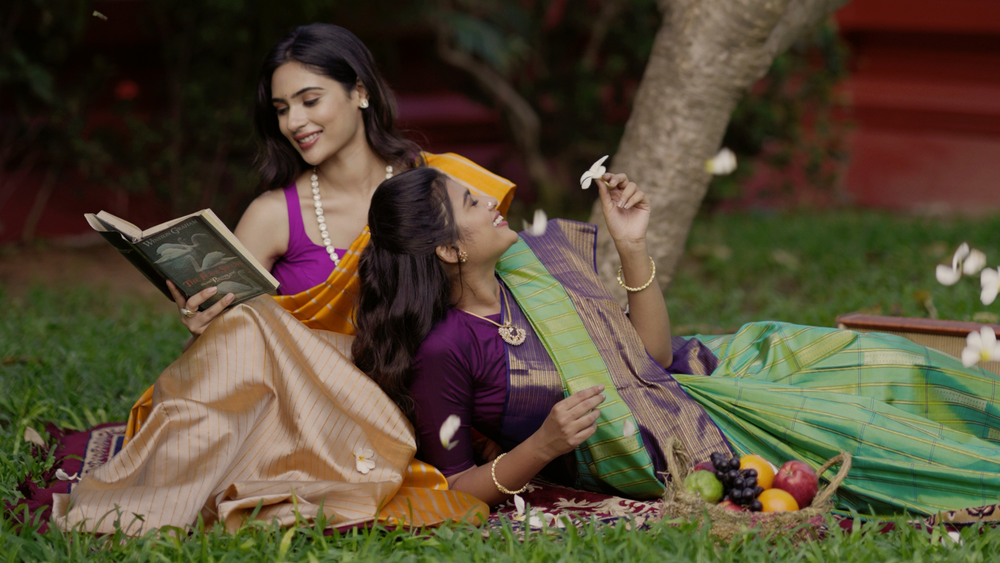The Language of Flowers: Exploring Floral Motifs in Kanjivaram Sarees
At Pashudh, every motif tells a story, and every petal holds a promise. Let’s explore the vibrant world of floral Kanjivarams, where tradition, art, and symbolism come together on pure silk.
Kanjivaram silks are not just heirlooms. They tell stories, with each thread rich in history. Among their many celebrated design elements, floral motifs are notable for their quiet elegance and deep symbolism.
From the sacred lotus blooming in temple tanks to jasmine buds in bridal hair, flowers have always been a part of South Indian culture. In the ancient weaving town of Kanchipuram, artisans bring these motifs to life on looms. They understand not only the technique but also the spirit behind each design.
This blog explains the meaning of flowers in Kanjivaram silk. It offers insights into their symbolism, origins, patterns, and how Pashudh reimagines them for modern celebrations.
The use of floral designs in Indian textiles goes back to Sangam literature and early temple paintings. In Tamil Nadu, temple towns such as Kanchipuram served as spiritual centres and thriving craft hubs. The weaver community often drew inspiration from temple architecture, gardens, and scriptures. They brought gods, animals, and flowers to life through their yarns.
The local flora, including lotus (thamarai), jasmine (malligai), marigold, champaka (sampangi), and betel leaf, held great significance in rituals, poetry, and art. These were not just decorative options; they carried deep meanings.
Pashudh continues this tradition while expanding the boundaries of floral design. They use innovative weaving techniques, curated colour palettes, and thoughtful reinterpretations of heritage motifs
The Symbolism of South Indian Floral Motifs
Each floral design has its meaning. Here’s a closer look at the flowers commonly found in traditional Kanjivaram weaving:
1.Lotus (Thamarai)
Symbolism: Purity, rebirth, divine beauty
Cultural Significance: Linked with Goddess Lakshmi and Saraswati
Design Use: Seen in wide borders, elaborate pallus, and stylised motifs throughout the body
2. Jasmine (Malligai)
Symbolism: Grace, serenity, feminine strength
Cultural Significance: Frequently used in weddings, devotional offerings, and sacred rituals
Design Use: Appears as buds (malli moggu), scattered vines, or delicate buttas.
3. Marigold (Samanthi)
Symbolism: Joy, energy, celebration
Cultural Significance: Essential for festive décor, rituals, and temple garlands
Design Use: Bold petals woven into contrasting borders or all-over patterns.
4. Tulsi and Petal Leaves
Symbolism: Devotion, sanctity, divine energy
Cultural Significance: Used in prayers, poojas, and sacred rites
Design Use: Featured in minimalist designs, often interwoven with vines.
Floral Motif Styles in Kanjivaram Weaving
All-Over Floral Jaals
These mesmerising designs showcase an intricate tapestry of vines and blossoms, creating bold statement pieces that are ideal for weddings and special occasions, ensuring you shine with elegance and grace.
Border and Pallu Blooms
In this exquisite style, floral motifs elegantly adorn the borders and pallu, allowing the body of the saree to maintain a serene simplicity. This thoughtful contrast enhances the overall allure, making it a timeless choice.
Floral Buttas
Delicate and charming, these smaller, repeated flower motifs—often inspired by jasmine buds or lotus petals—are woven in a rhythmic grid across the saree's body, infusing it with a captivating rhythm and a touch of natural beauty.
Vines and Creepers
Embodying the essence of nature, this style features flowing vines adorned with blossoms that are meticulously detailed. The design adds a dynamic sense of movement to the layout, evoking the enchanting dance of flora in full bloom.
At Pashudh, we focus on blending traditional weaving methods with a strong respect for nature-inspired symbols. Floral designs are not just decorative; they are thoughtful expressions.
In our floral collection, you will find:
- Dual-tone silks with antique lotus borders
- Pastel silks accented with jasmine buttas
- Contrast pallus decorated with blooming vines
- Meenakari-style zari patterns in multiple thread colors
We work with skilled weavers who bring each motif to life with care and cultural respect. From the gentle curves of a petal to the shimmer of sunlight on zari, every detail is purposeful.
The Enduring Appeal of Floral Kanjivarams
Flowers are universal symbols of beauty, growth, and emotion.
Here’s why floral motifs continue to flourish in Kanjivaram silks:
| Reason | Significance |
|
Deep cultural roots |
Reflect nature’s role in Indian rituals and art |
|
Emotionally resonant |
Often tied to love, celebrations, and spiritual moments |
| Versatility in design | Can be bold, intricate, minimal, or vintage |
| Timeless elegance | Unaffected by trends, suitable for all generations |
| Styling flexibility | Easy to dress up or down across traditional and contemporary looks |
For the Bride Who Blooms
Floral Kanjivarams are especially loved by brides who want to blend traditional richness with feminine elegance. Whether it’s for the muhurtham, engagement, or reception, a floral drape represents softness, strength, and celebration.
Popular Pashudh bridal picks include:
- Blush pink silks with meenakari vines
- Deep red or aubergine silks with lotus panel borders
- Ivory and gold silks with jasmine bud buttas
- Mint green and coral weaves with cascading floral jaals
Each piece celebrates the blooming journey of a bride stepping into a new phase of life. It is rooted in grace and wrapped in legacy.
Styling Your Floral Silk: Classic Meets Contemporary
Pashudh silks with floral designs can be styled for different age groups and tastes. Here are some ideas:
Minimalist Bride: Pair it with a solid blouse and light temple jewellery.
Festive Chic: Layer it with a contrasting brocade blouse and bold earrings.
Contemporary Edge: Drape it with a belt and choose nude makeup for a modern look.
Heritage Vibe: Add a Kundan choker and Gajra for a timeless South Indian style.
Why Trust Pashudh:
Expertise: Pashudh works directly with master weavers in Kanchipuram. They have been perfecting their craft for generations. The team understands motif geometry, Zari behaviour, and loom techniques. This knowledge ensures every creation reflects their skill.
Authoritativeness: Pashudh is recognised for our fresh take on tradition. We have been featured in leading platforms and designer showcases. We earn praise for quality, consistency, and respect for culture.
Trustworthiness :The promise is in the details. This includes the weave pattern, zari purity, and fabric composition, as well as clear pricing and styling guides we provide. Every Pashudh saree includes care instructions, authenticity checks, and complete customer support.
Floral Kanjivarams represent a blend of nature and tradition. They are woven with the same care as temple rituals and are as timeless as the flowers they show. Each design is more than just decoration; it reflects tradition, devotion, and feminine grace.
At Pashudh, our floral Kanjivarams carry the quiet strength of the lotus, the gentle beauty of jasmine, and the joyful spirit of marigolds. All are spun into silk and made to last for generations. Shop floral kanjivarams only at Pashudh.






Leave a comment